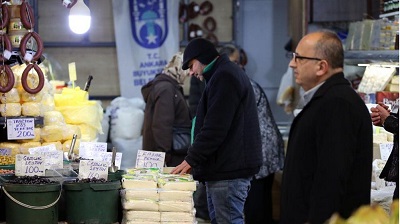Ankara, (Asian independent) Despite the economic revamp, inflation in Turkey remained stubbornly high, and many consumers said their living standards continue to decline.
In December 2023, inflation in Turkey rose to 64.8 per cent on an annual basis, an acceleration from 62 per cent in November, reports Xinhua news agency.
Inflation has been back on the rise since last summer, with market watchers and the government saying that this cycle should hit its peak by mid-2024, to 70 per cent, before decelerating to around 40 percent at the end of the year.
The country’s central bank made a sharp pivot in June when it began hiking interest rates under a new economic team.
The rates have since been lifted from 8.5 per cent to 42.5 per cent.
With a series of other recovery measures, there seems to be light ahead for the national economy, observers believe, but for the time being, ordinary citizens are continuing to feel the pinch of rising prices of most goods, especially food.
Foodstuff prices have soared by 72 per cent in a year, according to the Turkish Statistical Institute, pushing consumers to purchase the bare minimum.
To compensate for the skyrocketing inflation, the government has decided to raise the minimum wage by almost half to 17,002 liras ($570) per month this year.
However, for some economists, this substantial hike will not help workers to make ends meet for long.
President Recep Tayyip Erdogan has promised that inflation will drop significantly in the summer and that consumers will see some reprieve.
Last week, he said in a public speech in Istanbul, the country’s financial hub, that his government “will not allow its citizens to be crushed by inflation”.
Yet some people expressed less confidence in the economy.
According to a survey conducted by MetroPOLL research company in December 2023, 56.1 per cent of respondents said their standards of living have worsened in the past six months due to economic woes, compared to 21.4 per cent saying their living conditions improved and 22 per cent saying there has been no change.









